Fleurs du Mal Magazine


Or see the index

Graffiguur
Bij het beeld van Julien Dillens
Uit het meisje dat poseerde voor
dit beeld moet haast zeker weer een
vrouw gegroeid zijn, die misschien
nog altijd niet weet of ze zichzelf terug
ging zien. Ze kan, over het definitieve
dezer vorm, haar grieven hebben gekend.
Je went niet graag aan jezelf als dat je
huiveren doet. Er is een moed die dat ontstijgt:
Je zwijgt, leeft voort en vermoedt je eigen graf.
Hoe kan marmer, koud als steen toch, warme
tranen laten vloeien over vlees? Is zij, deze
graffiguur, de ware grootte van verdriet?
Bert Bevers
(Verschenen in Afglans – Gedichten 1972-1997, WEL, Bergen op Zoom, 1997)
fleursdumal.nl magazine
More in: Archive A-B, Bevers, Bert
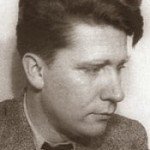
Hendrik Marsman
(1899-1940)
Slapende vrouw
De onrust en de lichtbewogen
ontvanklijkheid van hare trekken
zijn weggewist en overtogen
door maanlicht, dat in zachte plekken
gestort ligt over kruin en peluw —
en dekens die haar slaap bedekken
welven het maanlicht tot een landschap,
een keten die zijn tere bekkens
van zilverglans doet overstromen —
hoe lieflijk droomt het hoofd daarboven:
de mond, die vlinders niet zou wekken
is vaag geopend en de ogen
die overdag het leven vingen
liggen behoedzaam nu geloken
tussen de ijle zwarte veren
van wimpers en van wenkbrauwbogen.
(Uit: Porta Nigra (1934))
Hendrik Marsman poetry
fleursdumal.nl magazine
More in: Archive M-N, Marsman, Hendrik
De Nederlandse dichter en prozaschrijver Sybren Polet is op 19 juli 2015 Amsterdam overleden.
Polet debuteerde als dichter in 1946 met de bundel Genesis. Hij was jarenlang medewerker en redacteur van het literaire tijdschrift Podium. In 1961 verscheen zijn eerste roman Breekwater.
 Het proza van Sybren Polet had een sterk experimenteel en vernieuwend karakter, waarbij hij de grenzen tussen genres en de conventies inzake structuur en chronologie wist te doorbreken. Ondanks een groeiende weerstand tegen het literaire experiment, zou Polet dit genre zijn leven lang blijven beoefenen. Hij koos zelf voor de term Ander proza.
Het proza van Sybren Polet had een sterk experimenteel en vernieuwend karakter, waarbij hij de grenzen tussen genres en de conventies inzake structuur en chronologie wist te doorbreken. Ondanks een groeiende weerstand tegen het literaire experiment, zou Polet dit genre zijn leven lang blijven beoefenen. Hij koos zelf voor de term Ander proza.
Sybren Polet ontving veel waardering voor zijn literaire werk door middel van diverse literaire prijzen:
1959 – Jan Campert-prijs voor Geboorte-stad
1959 – Poëzieprijs van de gemeente Amsterdam voor Vleselijke stad
1972 – Herman Gorterprijs voor Persoon/onpersoon
1973 – Busken Huetprijs voor Literatuur als werkelijkheid. Maar welke?
2003 – Constantijn Huygens-prijs voor zijn gehele oeuvre
2005 – Dirk Martensprijs voor Een geschreven leven
fleursdumal.nl magazine
More in: Archive O-P, BIOGRAPHY, EXPRESSIONISM, DADA & DE STIJL, SURREALISM, In Memoriam
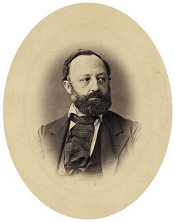
Gottfried Keller
(1819-1890)
Die kleine Passion
Der sonnige Duft, Semptemberluft,
sie wehten ein Mücklein mir aufs Buch.
Das suchte sich die Ruhegruft
und fern vom Wald sein Leichentuch.
Vier Flügelein von Seiden fein
trug’s auf dem Rücken zart,
drin man im Regenbogenschein
spielendes Licht gewahrt!
Hellgrün das schlanke Leibchen war,
hellgrün der Füßchen dreifach Paar,
und auf dem Köpfchen wundersam
saß ein Federbüschchen stramm;
die Äuglein wie ein goldnes Erz
glänzten mir in das tiefste Herz.
Dies zierliche und manierliche Wesen
hatt’ sich zu Gruft und Leichentuch
das glänzende Papier erlesen,
darin ich las, ein dichterliches Buch;
so ließ den Band ich aufgeschlagen
und sah erstaunt dem Sterben zu,
wie langsam, langsam ohne Klagen
das Tierlein kam zu seiner Ruh.
Drei Tage ging es müd und matt
umher auf dem Papiere;
die Flügelein von Seide fein,
sie glänzten alle viere.
Am vierten Tage stand es still
gerade auf dem Wörtlein “will”!
Gar tapfer stand’s auf selbem Raum,
hob je ein Füßchen wie im Traum;
am fünften Tage legt’ es sich,
doch noch am sechsten regt’ es sich;
am siebten endlich siegt’ der Tod,
da war zu Ende seine Not.
Nun ruht im Buch sein leicht Gebein,
mög’ uns sein Frieden eigen sein!
Gottfried Keller poetry
fleursdumal.nl magazine
More in: Archive K-L, Keller, Gottfried
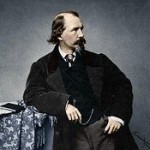
Emanuel Geibel
(1815-1884)
Hoffnung
Und dräut der Winter noch so sehr
mit trotzigen Gebärden,
und streut er Eis und Schnee umher,
es muß doch Frühling werden.
Blast nur, ihr Stürme, blast mit Macht,
mir soll darob nicht bangen,
auf leisen Sohlen über Nacht
kommt doch der Lenz gegangen.
Drum still! Und wie es frieren mag,
o Herz, gib dich zufrieden,
es ist ein großer Maientag
der ganzen Welt beschieden.
Und wenn dir oft auch bangt und graut,
als sei die Höll’ auf Erden,
nur unverzagt auf Gott vertraut!
Es muß doch Frühling werden.
Emanuel Geibel Gedicht
fleursdumal.nl magazine
More in: Archive G-H, CLASSIC POETRY

Aphra Behn
(1640 – 1689)
The Disappointment
1
One Day the Amarous Lisander,
By an impatient Passion sway’d,
Surpris’d fair Cloris, that lov’d Maid,
Who cou’d defend her self no longer ;
All things did with his Love conspire,
The gilded Planet of the Day,
In his gay Chariot, drawn by Fire,
War now descending to the Sea,
And left no Light to guide the World,
But what from Cloris brighter Eves was hurl’d.
2
In alone Thicket, made for Love,
Silent as yielding Maids Consent,
She with a charming Languishment
Permits his force, yet gently strove ?
Her Hands his Bosom softly meet,
But not to put him back design’d,
Rather to draw him on inclin’d,
Whilst he lay trembling at her feet;
Resistance ’tis to late to shew,
She wants the pow’r to sav — Ah!what do you do?
3
Her bright Eyes sweat, and yet Severe,
Where Love and Shame confus’dly strive,
Fresh Vigor to Lisander give :
And whispring softly in his Ear,
She Cry’d — Cease — cease — your vain desire,
Or I’ll call out — What wou’d you do ?
My dearer Honour, ev’n to you,
I cannot — must not give — retire,
Or take that Life whose chiefest part
I gave you with the Conquest of my Heart.
4
But he as much unus’d to fear,
As he was capable of Love,
The blessed Minutes to improve,
Kisses her Lips, her Neck, her Hair !
Each touch her new Desires alarms !
His burning trembling Hand he prest
Upon her melting Snowy Breast,
While she lay panting in his Arms !
All her unguarded Beauties lie
The Spoils and Trophies of the Enemy.
5
And now, without Respect or Fear,
He seeks the Objects of his Vows ;
His Love no Modesty allows :
By swift degrees advancing where
His daring Hand that Alter seiz’d,
Where Gods of Love do Sacrifice ;
That awful Throne, that Paradise,
Where Rage is tam’d, and Anger pleas’d ;
That Living Fountain, from whose Trills
The melted Soul in liquid Drops distils.
6
Her balmy Lips encountring his,
Their Bodies as their Souls are joyn’d,
Where both in Transports were confin’d,
Extend themselves upon the Moss.
Cloris half dead and breathless lay,
Her Eyes appear’d like humid Light,
Such as divides the Day and Night;
Or falling Stars, whose Fires decay ;
And now no signs of Life she shows,
But what in short-breath-sighs returns and goes.
7
He saw how at her length she lay,
He saw her rising Bosom bare,
Her loose thin Robes, through which appear
A Shape design’d for Love and Play;
Abandon’d by her Pride and Shame,
She do’s her softest Sweets dispence,
Offring her Virgin-Innocence
A Victim to Loves Sacred Flame ;
Whilst th’ or’e ravish’d Shepherd lies,
Unable to perform the Sacrifice.
8
Ready to taste a Thousand Joys,
Thee too transported hapless Swain,
Found the vast Pleasure turn’d to Pain :
Pleasure, which too much Love destroys !
The willing Garments by he laid,
And Heav’n all open to his view ;
Mad to possess, himself he threw
On the defenceless lovely Maid.
But oh ! what envious Gods conspire
To snatch his Pow’r, yet leave him the Desire !
9
Natures support, without whose Aid
She can no humane Being give,
It self now wants the Art to live,
Faintness it slacken’d Nerves invade :
In vain th’ enraged Youth assaid
To call his fleeting Vigour back,
No Motion ’twill from Motion take,
Excess of Love his Love betray’d ;
In vain he Toils, in vain Commands,
Th’ Insensible fell weeping in his Hands.
10
In this so Am’rous cruel strife,
Where Love and Fate were too severe,
The poor Lisander in Despair,
Renounc’d his Reason with his Life.
Now all the Brisk and Active Fire
That should the Nobler Part inflame,
Unactive Frigid, Dull became,
And left no Spark for new Desire ;
Not all her Naked Charms cou’d move,
Or calm that Rage that had debauch’d his Love.
11
Cloris returning from the Trance
Which Love and soft Desire had bred,
Her tim’rous Hand she gently laid,
Or guided by Design or Chance,
Upon that Fabulous Priapus,
That Potent God (as Poets feign.)
But never did young Shepherdess
(Garth’ring of Fern upon the Plain)
More nimbly draw her Fingers back,
Finding beneath the Verdant Leaves a Snake.
12
Then Cloris her fair Hand withdrew,
Finding that God of her Desires
Disarm’d of all his pow’rful Fires,
And cold as Flow’rs bath’d in the Morning-dew.
Who can the Nymphs Confusion guess ?
The Blood forsook the kinder place,
And strew’d with Blushes all her Face,
Which both Disdain and Shame express ;
And from Lisanders Arms she fled,
Leaving him fainting on the gloomy Bed.
13
Like Lightning through the Grove she hies,
Or Daphne from the Delphick God ;
No Print upon the Grassie Road
She leaves, t’ instruct pursuing Eyes.
The Wind that wanton’d in her Hair,
And with her ruffled Garments plaid,
Discover’d in the flying Maid
All that the Gods e’re made of Fair.
So Venus, when her Love was Slain,
With fear and haste flew o’re the fatal Plain.
14
The Nymphs resentments, none but I
Can well imagin, and Condole ;
But none can guess Lisander’s Soul,
But those who sway’d his Destiny :
His silent Griefs, swell up to Storms,
And not one God, his Fury spares,
He Curst his Birth, his Fate, his Stars,
But more the Shepherdesses Charms ;
Whose soft bewitching influence,
Had Damn’d him to the Hell of Impotence.
Aphra Behn poetry
fleursdumal.nl magazine
More in: Archive A-B, CLASSIC POETRY
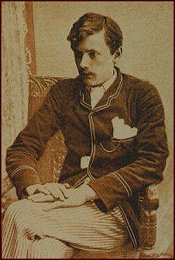
Ernest Dowson
(1867-1900)
Cease Smiling, Dear! A Little While Be Sad
Dum nos fata sinunt, oculos satiemus Amore
Propertius
Cease smiling, Dear! a little while be sad,
Here in the silence, under the wan moon;
Sweet are thine eyes, but how can I be glad,
Knowing they change so soon?
For Love’s sake, Dear, be silent! Cover me
In the deep darkness of thy falling hair:
Fear is upon me and the memory
Of what is all men’s share.
O could this moment be perpetuate!
Must we grow old, and leaden-eyed and gray,
And taste no more the wild and passionate
Love sorrows of to-day?
Grown old, and faded, Sweet! and past desire,
Let memory die, lest there be too much ruth,
Remembering the old, extinguished fire
Of our divine, lost youth.
O red pomegranate of thy perfect mouth!
My lips’ life-fruitage, might I taste and die
Here in thy garden, where the scented south
Wind chastens agony;
Reap death from thy live lips in one long kiss,
And look my last into thine eyes and rest:
What sweets had life to me sweeter than this
Swift dying on thy breast?
Or, if that may not be, for Love’s sake, Dear!
Keep silence still, and dream that we shall lie,
Red mouth to mouth, entwined, and always hear
The south wind’s melody,
Here in thy garden, through the sighing boughs,
Beyond the reach of time and chance and change,
And bitter life and death, and broken vows,
That sadden and estrange.
Ernest Dowson poetry
fleursdumal.nl magazine
More in: Archive C-D, Dowson, Ernest

William Ernest Henley
(1849 – 1903)
When you are old
When you are old, and I am passed away—
Passed, and your face, your golden face, is gray—
I think, whate’er the end, this dream of mine,
Comforting you, a friendly star will shine
Down the dim slope where still you stumble and stray.
So may it be: that so dead Yesterday,
No sad-eyed ghost but generous and gay,
May serve you memories like almighty wine,
When you are old!
Dear Heart, it shall be so. Under the sway
Of death the past’s enormous disarray
Lies hushed and dark. Yet though there come no sign,
Live on well pleased: immortal and divine
Love shall still tend you, as God’s angels may,
When you are old.
William Ernest Henley poetry
fleursdumal.nl magazine
More in: Archive G-H, Archive G-H, CLASSIC POETRY, Henley, William Ernest
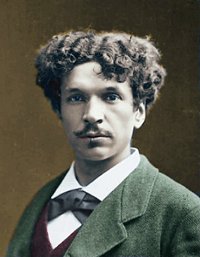
Charles Cros
(1842 – 1888)
Le meuble – Fantaisie
A Madame Mauté de Fleurville.
Il m’a fallu avoir le regard bien rapide, l’oreille bien fine, l’attention bien aiguisée,
Pour découvrir le mystère du meuble, pour pénétrer derrière les perspectives de marqueterie, pour atteindre le monde imaginaire à travers les petites glaces.
Mais j’ai enfin entrevu la fête clandestine, j’ai entendu les menuets minuscules, j’ai surpris les intrigues compliquées qui se trament dans le meuble.
On ouvre les battants, on voit comme un salon pour des insectes, on remarque les carrelages blancs, bruns et noirs en perspective exagérée.
Une glace au milieu, une glace à droite, une glace à gauche, comme les portes dans les comédies symétriques.
En vérité ces glaces sont des portes ouvertes sur l’imaginaire.
Mais une solitude évidemment inaccoutumée, une propreté dont on cherche le but en ce salon où il n’y a personne, un luxe sans raison pour un intérieur où ne régnerait que la nuit.
On est dupe de cela, on se dit « c’est un meuble et voilà tout, » on pense qu’il n’y a rien derrière les glaces que le reflet de ce qui leur est présenté.
Insinuations qui viennent de quelque part, mensonges soufflés à notre raison par une politique voulue, ignorances où nous tiennent certains intérêts que je n’ai pas à définir.
Pourtant je n’y veux plus mettre de prudence, je me moque de ce qui peut en arriver, je n’ai pas souci des rancunes fantastiques.
Quand le meuble est fermé, quand l’oreille des importuns est bouchée par le sommeil ou remplie des bruits extérieurs, quand la pensée des hommes s’appesantit sur quelque objet positif,
Alors d’étranges scènes se passent dans le salon du meuble; quelques personnages de taille et d’aspect insolites sortent des petites glaces; certains groupes, éclairés par des lueurs vagues, s’agitent en ces perspectives exagérées.
Des profondeurs de la marqueterie, de derrière les colonnades simulées, du fond des couloirs postiches ménagés dans le revers des battants,
S’avancent, en toilettes surannées, avec une démarche frétillante et pour une fête d’almanach extraterrestre,
Des élégants d’une époque de rêve, des jeunes filles cherchant un établissement en cette société de reflets et enfin les vieux parents, diplomates ventrus et douairières couperosées.
Sur le mur de bois poli, accrochées on ne sait comment, les girandoles s’allument.
Au milieu de la salle, pendu au plafond qui n’existe pas, resplendit un lustre surchargé de bougies roses, grosses et longues comme des cornes de limaçons.
Dans des cheminées imprévues, des feux flambent comme des vers luisants.
Qui a mis là ces fauteuils, profonds comme des coques de noisettes et disposés en cercle, ces tables surchargées de rafraîchissements immatériels ou d’enjeux microscopiques, ces rideaux somptueux — et lourds comme des toiles d’araignée?
Mais le bal commence.
L’orchestre, qu’on croirait composé de hannetons, jette ses notes, pétillements et sifflements imperceptibles.
Les jeunes gens se donnent la main et se font des révérences.
Peut-être même quelques baisers d’amour fictif s’échangent à la dérobée, des sourires sans idée se dissimulent sous les éventails en ailes de mouche, des fleurs fanées dans les corsages sont demandées et données en signe d’indifférence réciproque.
Combien cela dure-t-il?
Quelles causeries s’élèvent dans ces fêtes?
Où va ce monde sans substance, après la soirée?
On ne sait pas.
Puisque, si l’on ouvre le meuble, les lumières et les feux s’éteignent: les invités, élégants, coquettes et vieux parents disparaissent pêle-mêle, sans souci de leur dignité, dans les glaces, couloirs et colonnades; les fauteuils, les tables et les rideaux s’évaporent.
Et le salon reste vide, silencieux et propre;
Aussi tout le monde le dit « c’est un meuble de marqueterie et voilà tout, » sans se douter qu’aussitôt le regard détourné.
De petits visages narquois se hasardent à sortir des glaces symétriques, de derrière les colonnes incrustées, du fond des couloirs postiches.
Et il faut un œil particulièrement exercé, minutieux et rapide, pour les surprendre quand ils s’éloignent en ces perspectives exagérées, lorsqu’ils se réfugient dans les profondeurs imaginaires des petites glaces, à l’instant où ils rentrent dans les cachettes irréelles du bois poli.
Charles Cros poetry
fleursdumal.nl magazine
More in: Archive M-N, Cros, Charles

Paul Klee
(1879-1940)
Elend
Land ohne Band,
neues Land,
ohne Hauch
der Erinnerung,
mit dem Rauch
von fremdem Herd.
Zügellos!
wo mich trug
keiner Mutter Schoß.
Paul Klee Gedicht, 1914
fleursdumal.nl magazine
More in: Archive K-L, Expressionism, Klee, Paul
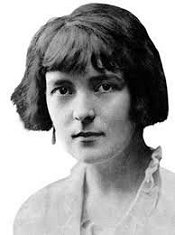
Katherine Mansfield
(1888 – 1923)
Sleeping Together
Sleeping together… how tired you were…
How warm our room… how the firelight spread
On walls and ceiling and great white bed!
We spoke in whispers as children do,
And now it was I—and then it was you
Slept a moment, to wake—”My dear,
I’m not at all sleepy,” one of us said….
Was it a thousand years ago?
I woke in your arms—you were sound asleep—
And heard the pattering sound of sheep.
Softly I slipped to the floor and crept
To the curtained window, then, while you slept,
I watched the sheep pass by in the snow.
O flock of thoughts with their shepherd Fear
Shivering, desolate, out in the cold,
That entered into my heart to fold!
A thousand years… was it yesterday
When we two children of far away,
Clinging close in the darkness, lay
Sleeping together?… How tired you were….
Katherine Mansfield poetry
fleursdumal.nl magazine
More in: Archive M-N, Katherine Mansfield, Mansfield, Katherine
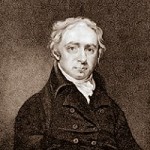
William Lisle Bowles
(1762 – 1850)
In Age
And art thou he, now “fallen on evil days,”
And changed indeed! Yet what do this sunk cheek,
These thinner locks, and that calm forehead speak!
A spirit reckless of man’s blame or praise,–
A spirit, when thine eyes to the noon’s blaze
Their dark orbs roll in vain, in suffering meek,
As in the sight of God intent to seek,
Mid solitude or age, or through the ways
Of hard adversity, the approving look
Of its great Master; whilst the conscious pride
Of wisdom, patient and content to brook
All ills to that sole Master’s task applied,
Shall show before high heaven the unaltered mind,
Milton, though thou art poor, and old, and blind!
William Lisle Bowles poetry
fleursdumal.nl magazine
More in: Archive A-B, CLASSIC POETRY
Thank you for reading Fleurs du Mal - magazine for art & literature